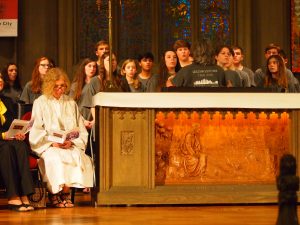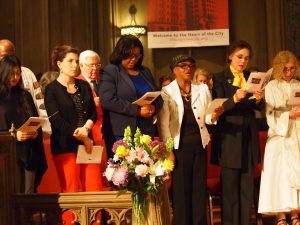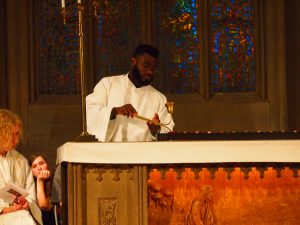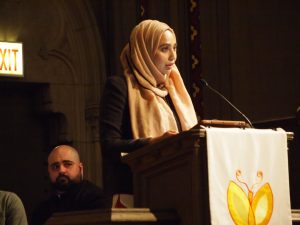Memorial service for Cook County’s indigent a reminder on respect
By Kevin Beese Staff reporter — June 4, 2018
Members of the Wesleyan Youth Choir from Athens (Ga.) First United Methodist Church sing “Welcome to God’s Love” as part of the Interfaith Memorial Service. (Kevin Beese/Chronicle Media)
“To live and die alone is a human tragedy, but not to be remembered and mourned after earthly life is an ugly blemish on human dignity.”
— W. Earl Lewis (1949-99)
Founder of the Interfaith Memorial Service for Indigent Persons
With reverence, local clergy and lay leaders read the names of 278 individuals who may otherwise not have been remembered in death.
The 33rd annual Interfaith Memorial Observance for Indigent Persons conducted last week at First United Methodist Church at The Chicago Temple commemorated the lives of individuals laid to rest last fall by the Cook County Medical Examiner’s Office.

Area religious leaders sing during the 33rd annual Interfaith Memorial Service for Indigent Persons last week at First United Methodist Church at The Chicago Temple. (Kevin Beese/Chronicle Media)
“Every person deserves to live and die with dignity and respect,” said the Rev. Alka Lyall, pastor of Broadway United Methodist Church in Chicago, who gave the keynote address for the program.
Lyall pointed out that the words “We belong to God and to God we return” are from the Koran, but are said every time we say goodbye to someone in death.
“Every life is sacred. Every life deserves dignity and respect,” Lyall said. “ We don’t know the circumstances of these individuals’ lives with certainty, but we know that they belong to God and that they returned to God.
“My heart is also their hearts today. We acknowledge them as persons. We give of our free will to show humility and respect to individuals after their lives on earth end.”
Lyall noted that each person is someone’s child and should be remembered.
“What would the world look like if we were able to see God in every person?” she asked.

The last of 12 candles is lit remembering indigent individuals who died and were buried in Cook County. (Kevin Beese/Chronicle Media)
She said making a difference in the world is as simple as making a conscience decision to change.
“We can do better. We can live differently,” Lyall said. “We can be a community that treats people with respect in life. We can be a community that treats people with respect in death.”
Earl Lewis, the Memorial Ministry’s founder, was a doorman working in Chicago when he read about the burial of indigent people in mass graves. Lewis worked for two years setting up a network to establish the annual Interfaith Memorial Service — the first service being in 1986.
Since then, there have been observances at churches and chapels throughout Cook County paying tribute to the lives of 7,000 babies, children and adults, many of whom were buried with their identity unknown.
“This is one of the most meaningful events I attend every year,” Cook County Board President Toni Preckwinkle said.
“These are our neighbors, brothers, daughters, fathers and mothers,” Preckwinkle said.

Ramona Manzoor reads the names of indigent persons during the Interfaith Memorial Service. (Kevin Beese/Chronicle Media)
The County Board president said it is government’s role to provide services as effectively and efficiently as possible, but it is also to show compassion.
She noted that in 2017 the county and Catholic Cemeteries of Chicago buried 570 people that may have otherwise not been remembered.
“This memorial is a symbol of the county caring and it will continue in the county for years to come,” Preckwinkle said.
Get your free subscription of the Cook County e-edition
—- Memorial service for Cook County’s indigent a reminder on respect —



